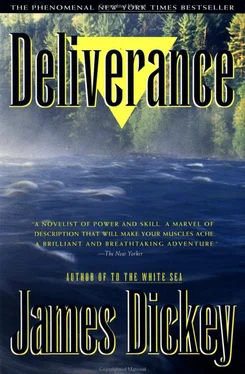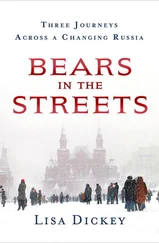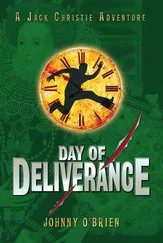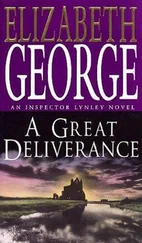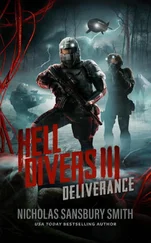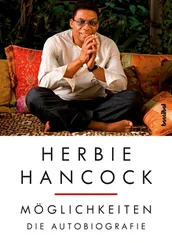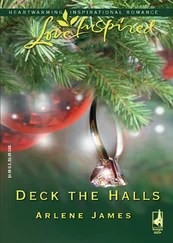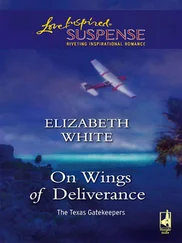“I couldn’t see anything,” he said. “Looking straight up, I couldn’t even see the sky.”
“No sky,” I said.
“No sky at all.”
I rounded my hurt side, back to the patrolman. “Wait’ll you see it,” I said. “You’ll understand what the man’s talking about.”
“Y’all want to wait, on down here a ways?” one of the policemen, a new one, said to us. We pulled back, down along the corridor. But Lewis had got the message; I was sure he had, and not too soon.
Bobby and I walked along in our new clothes. Neither of us had had a chance to shave, and we were pretty grubby, but clean. A shave would have made me a completely new person, but I was half-new anyway, and half-new was very good; it is better to come back easily.
After about fifteen minutes the new officer walked ordinarily along to us. “Why’ont we go on back into town?” he said.
“All right,” I told him. “Whatever you say.”
I got into the front seat of the patrol car with him, and we started back. I didn’t say anything and he didn’t either. When we reached town he went into a cafe and made a couple of calls. It frightened me some to watch him talk through the tripled glass—windshield, plate glass and phone booth glass—for it made me feel caught in the whole vast, inexorable web of modern communications. I was not sure that this was not the beginning of the enormous, unfathomable apparatus of crime detection, from which no one is entirely free: I could imagine stupendous filing systems, IBM machines tirelessly sorting punch cards, one thing being checked against another: I was not sure he was not talking to J. Edgar Hoover. Our story could not stand up against that, I was sure. And yet it might, even so.
The patrolman came back and sat with me, with his door open. In a little while two more patrol cars showed up. A small crowd started to drift together; a head turned toward us, and another: eventually, all heads looked at us at least once, and most of them more than once. I sat still, in my clothes of the country. I could prove where I had bought them. My hurt was good in the midst of the general unhurt.
One of the police from another car was talking to a local fellow about roads going up the river. A few minutes after this, we all got ready to start out. I looked for Bobby; he was in one of the new highway patrol cars. As we left, another police car, very local-looking, drove up and by, and I saw my man, an old fellow, rusty and quiet. There was going to be a meeting, somewhere upriver. My beard tingled at the roots, and I started to calculate, yet once again.
We turned off the highway and drove down a little road that swung through a farmer’s yard and then through his chicken yard. A woman was feeding chickens, muffled up against the sun as though against cold.
We moved on, slower and slower. Nothing had happened yet; nothing had happened to any of us yet. There had been no accusations made, nothing discovered. My lies seemed better, more and more like truth; the bodies in the woods and in the river did not move.
We were the lead car. We took off through some glaring cornfields and then into poor-looking woods, second-growth pines like turpentine trees. I listened for the river, but saw it before I heard it. The road got worse and worse the nearer we got; it figured. At the river’s edge we were crawling.
“This about where it was?” the cop asked me.
“No,” I said, waking from a half-sleep I didn’t know I was in. “It was farther up. We wouldn’t have come down here all the way from Oree if we wanted to turn the canoe over in calm water.”
He looked at me oddly, or I suppose he did, for I was watching straight ahead for the yellow tree, and listening—one more time—for the falls; it seemed curious to be going toward them from this direction.
It was an hour of slow going, over gullies and washouts with just enough track for regular cars—if it had got any worse it would have been jeep or Land Rover country—before we saw the tree. I saw the color and then the lightning jag, and my heart jumped like a whole being, inside me and nearly out. The rapids were roaring, upstream about a quarter of a mile; I could see some of them now, and they were a lot worse, even, than I remembered. The falloff was a good six feet, and the only place where a canoe could get through was a funnel of water into which the whole river cramped and shot, blizzarding through the stones and beating and fuming like some enormous force chained to the Spot.
The policeman pointed. “He’d be right in here?”
“I’d say so,” I said. “He may be downstream farther, though. Or he may be caught in the rocks. But we probably ought to start here.”
We all got out and moved toward each other. I watched Bobby over the hoods and backs of cars. He was not moving among the men. They were wandering rather freely around him, and his stillness in the midst of them suggested that he was not able to move as freely as they, or at all. I don’t think anyone noticed this but me, or put this interpretation on it, but it made me nervous; he already looked like a prisoner; for an instant I actually thought he was in leg shackles. I started toward him, but the police from the three cars always came between us, which must have been intentional, though they managed to give the impression it wasn’t. Then Bobby moved like everybody else, toward the river.
Meanwhile other cars were creeping up to us, and pretty soon they filled up the bank all the way out of sight downriver. The men who got out of them were farmers, mostly, and small merchants, or so I supposed. Some of them brought long ropes with hooks—grapples—on them, and I understood the full horror of the phrase I was always seeing in the newspapers, especially in the summer: “drag the river for the body.” Drag was right.
“This the place?” the patrolman asked me again.
“It’s the best I can do,” I said. “As far as I’m concerned, this is it.”
The men began to deploy with their ropes and hooks. The stream was not deep at this point, about up to their waists or lower chests. The river ran through them easily. I watched the chains and ropes and wire cables come up from the water empty, in a certain rhythm. They always seemed to have grasped something when the hooks were underwater, and just to have let it go when they were pulled back up. I sat under a bush with the patrolman who had driven me out, watching each of the men in waders do what he was doing at the moment, and remembered the ring on Drew’s finger and the dead guitar calluses on his hand as he fell from my arms.
Someone was coming, casually but deliberately. I turned to say something to the patrolman, so that I would seem unaware of the other person’s approach.
“Say, buddy,” the new man said. “Can I talk to you for a minute?”
“Sure,” I said. “Sit down.”
He did. We shook hands. He was an old seam-faced lightbodied man with hazel eyes. He wore his hat at the prescribed country tilt, which always amused me wherever I saw it. I almost smiled, but instead took a cigarette he offered and lit up.
“You sure this is the place?”
I repeated, “Not all that sure. But I can’t do any better. He’s either in those rocks up there, or here, or downstream. How far downstream I don’t know.”
“You say youus coming down this-yere river in a canoe?”
“Two canoes, we started with.”
“How come?”
“How come what?”
“How come you to be doing this, in the fust place?”
“Oh,” I said, hesitating and not really knowing the answer, even now. “I guess we just wanted to get out a little. All of us work in the city, and it gets pretty tiresome, just sitting in an office all the time. The fellow who broke his leg’s been up here before, fishing. He said we ought to see it before they dam the river and make a public park out of it. That’s all. No really good reason, I suppose. Just boredom.”
Читать дальше
